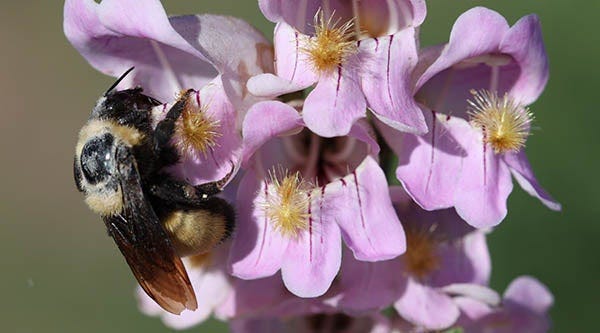By David Salman, High Country Gardens Chief Horticulturist
Pollinators are the pulse of the planet. To say pollination is an important process would be an understatement. Pollinators such as native bees, bumblebees, honey bees, butterflies, moths, and hummingbirds, need flowers for pollen and nectar to survive. The flowers need them, to help accomplish the pollination process that so the plants can propagate themselves. A healthy pollinator population means the area of the Earth on which they live is also healthy.
A large number of the Earth’s edible plants create their fruit and seeds with the help of pollinators moving pollen from plant to plant. We humans, along with the rest of the world’s animals, depend on this essential food cycle for our survival.
3 Pollinator Garden Essentials
As gardeners, we are involved in the pollination process even if we don’t think about it. And that’s because we love planting flowers! So when we plant an abundant garden or landscape and care for these plants in an organic environment, it provides for us humans too. This helps to complete the web of life.
To plan and plant a nectar garden for pollinators, we need to provide three basic elements:
- Shelter – buildings and gardens provide places where insects and hummingbirds can live.
- Water – a source of water is essential.
- Food Source – the plants that feed themselves and their young.
Food For Pollinators At All Life Stages
The fun part for gardeners is, of course, planting the plants that provide for the pollinators. We do this with two groups of plants: the food plants for caterpillars (of moths and butterflies) and nectar sources for adult moths and butterflies, bees, and hummingbirds.
- Herbs provide an excellent source of leaves for caterpillars. Always plant extra so there is enough for you and the caterpillars. Don’t forget Milkweed (Asclepias) for Monarch caterpillars.
- Flowering perennials, shrubs, and trees - provide nectar-rich flowers for adult moths and butterflies, bees, and hummingbirds.
Host plants are the plants that have co-evolved with certain species of insects and are essential for their survival. For example, Milkweed (Asclepias) is the host plant for Monarch Butterflies. Learn more about Monarchs & Milkweed.
Natural Nectar For Hummingbirds
I am an enthusiastic hummingbird gardener, so I’m always planting flowering plants to attract them. Want to see the magic of hummingbirds in your garden? Learn more in this helpful guide: Making Your Yard A Hummingbird Magnet.
Some of my favorite hummingbird plants:
- Beardtongue (Penstemon) – a large diverse group of wildflowers especially for western gardens
- Columbine (Aquilegia) – the best wildflowers to attract hummingbirds to your shady gardens!
- Beebalm (Monarda) – dazzling flowers in shades of pink and red
- Hummingbird Mint (Agastache) – beautiful flowers and aromatic oils in flowers and foliage
- Hummingbird Trumpet (Zauschneria) – wonderful orange flowers
- Sage (Salvia) - this includes our many native species and hybrids
- Purple Coneflower (Echinacea) - especially in the Mid-West and Eastern US
Shop Hummingbird Favorite Perennials
Natural Nectar For Butterflies, Moths & Bees
Want to see your garden buzzing with life? Learn more in our helpful guides: Providing Habitat for Bumblebees: Gardening with A Big Buzz and How To Plant A Butterfly Garden.
Some of my favorite plants for butterflies, moths, and all kinds of bees:
- Ornamental Onions (Allium) – fabulous for bees
- Beebalm (Monarda) - butterflies
- Yarrow (Achillea) - butterflies
- Lavender (Lavandula) - bees and butterflies
- Oregano (Origanum) - bees and butterflies
- Catmint (Nepeta) - bees and butterflies
- European Sage (Salvia) – Salvia nemerosa are superb varieties
- Purple Coneflower (Echinacea) – especially attractive to bumblebees
- Evening Primrose (Oenothera) - especially attractive to hawkmoth



